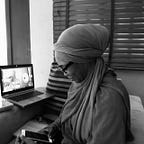WHEN ALL FEELS UNCONTROLLABLE, THESE TECH TOOLS COULD HELP TO BOOST YOUR MENTAL HEALTH
Technology causes depression. I know this sounds cliche. But what if technology could also help boost your mental health?
You’ve read hundreds of articles on how technology affects your mental health. Overcoming depression and aiming for success has never been more difficult. You’ve tried everything from taking a tech break to deleting your social media apps. And maybe, you’re still stuck where you’ve always been.
So you ask yourself “why read this one when it wouldn’t make a lasting difference”. Before we walk down this road, let’s take a look at the likely reasons why technology causes depression.
The relationship between technology and depression
No doubt, technology has made our lives inexorably easier compared to the previous generations. It has not only saved us the amount of energy spent on our everyday mundane tasks, but it has also afforded us the luxury of more free time to partake in more leisure activities outside of our work lives.
Despite these, statistics show that our generation is less happy than the older generations. This is because many careers today require at least some basic knowledge of technology. Their use, therefore, for many hours in a day has contributed to an increased rate of depression.
How technology affects mental health
- The information has never been more overwhelming: We are witnessing a new age where people have never before had so much access to information free of charge. The impact of this has been massive. Old jobs and professions are rapidly becoming extinct while many new ones are being created. Our brains may not be able to take in the intimidating amount of information that has flooded the world. Thanks to the internet and smartphones, the world is moving so fast and real life has become very slow and monotonous. Most of us, therefore, find ourselves getting drowned in the world of the internet that we do not even make time for the real world. In a bid to catch up with the fast-moving world, Our real-life relationships suffer, sleep patterns are disrupted ultimately leading to anxiety and depression.
2. Social media is a big one: After more than a decade of social media use by billions of people around the world, we have finally concluded that social media could be more harmful than beneficial. Now more than ever, we find ourselves caught up in an endless rat race as we continuously compare our lives to those of our friends and peers. Increased jealousy, envy and feelings of inferiority are natural responses to this and could affect our long term mental health. For when users experience envy of the lifestyles of their friends on social media, they are very likely to report feelings of depression.
Does this mean that technology as a whole is bad for us in the long run? Of course not! While many from the younger generations are seen to be making a conscious effort in disconnecting from the grid, the good news is there are now awesome mobile applications that help you connect to the real world and combat depression.
HEADSPACE — THE APP FOR MINDFULNESS
When everything feels uncontrollable, there’s nothing like turning towards meditation. Meditation greatly diminishes stress and anxiety. Taking a few moments out of your day to be mindful can help manage your thoughts and feelings. Winner of the editor’s choice award on the Apple app store, Headspace walks you through a meditation process that can help lift the weight off your shoulders. What’s more, tons of headspace users have suggested that meditating with the app has helped motivate them towards their success.
GRATITUDE JOURNAL — THE APP FOR GRATITUDE
Years of research have shown that focusing on the things you’re thankful for can improve your overall well being and make you happier. While there are lots of ways to practice gratitude, putting them down is one of the best ways to rip its benefits. I personally use the gratitude journal. It helps me track at least three things that I’m grateful for every day.
HAPPIFY — THE APP FOR POSITIVITY
According to statistics, 86% of happify users have reported that they are happier within just two months of using the app. Through fun games and science-based activities, the Happify app assists in overcoming negativity, reducing stress and building resilience. Available on both Android and IOS It provides users with tools to improve emotional well being and develop a positive mindset.
MOODNOTES — THE APP FOR JOURNALING
Studies have shown that one of the most effective ways of dealing with depression is journaling. Verbalizing your pain to others may be difficult, so writing down thoughts and feelings in a journal is a very healthy alternative. The Moodnote app not only provides a space for journaling, but it also helps to provide suggestions and new ways of thinking which in effect lowers your stress and improves your well being. Moodnote tracks your progress by helping you establish a link between your previous days and your current progress. And what better way to build more confidence than seeing how much progress you’ve made.
SUPERBETTER — THE APP FOR HABIT BUILDING
If you’ve always had a hard time building new habits, then you should absolutely try the SuperBetter app. In a very interesting way, the SuperBetter app nudges you towards doing simple tasks throughout the day and rewards you for doing them. When implemented in real everyday life, these small tasks will bring you great benefit. For example, if you have been sitting down for so long, SuperBetter will tell you to get up and go get a glass of water. If you keep doing these small tasks, you will develop healthy habits while conditioning yourself to avoid bad habits.
So here it is. Allow technology undo that which it has done to you. What better way to deal with it?
